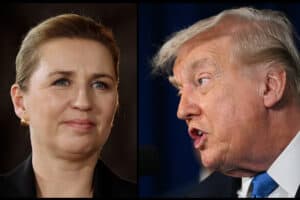Iraqi prime minister Adel Abdel Mahdi said the strike was a 'flagrant violation' of a security accord with the US, warning it would 'spark a devastating war in Iraq'.

A furious Iran threatened to avenge a US strike that killed a top Iranian commander at Baghdad’s international airport on Friday, raising fears of a wider regional conflict between the arch-foes.
The Pentagon said US President Donald Trump had ordered Qasem Soleimani’s “killing” after a pro-Iran mob this week laid siege to the US embassy in the Iraqi capital.
Iran’s supreme leader Ayatollah Ali Khamenei swiftly promised “severe revenge” for Soleimani’s death, the biggest escalation yet in a feared proxy war between Iran and the US on Iraqi soil.
Tens of thousands of angry Iranians took to the streets of Tehran chanting “Death to America” and holding up posters of Soleimani, who was widely admired in the Islamic republic.
Trump tweeted a picture of an American flag with no comment, then followed up by declaring Soleimani should have been killed “many years ago”.
US Secretary of State Mike Pompeo said Soleimani had been planning an “imminent” attack “that would have put dozens if not hundreds of American lives at risk”.
The US embassy in Baghdad urged all American citizens to leave Iraq “immediately” and US nationals working at southern oil fields were being evacuated, Iraq’s petrol ministry said.
Early on Friday, a precision drone strike struck two cars belonging to Iraq’s Hashed al-Shaabi, a paramilitary force with close ties to Iran, as they drove away from Baghdad International Airport.
Hours later, Iran’s Revolutionary Guard Corps announced Soleimani, who headed its Quds Force foreign operations arm, “was martyred in an attack by America”.
It said five Guards were killed in total as well as five members of the Hashed, which confirmed its deputy chief Abu Mahdi al-Muhandis was among those killed.
Quds Force chief Soleimani also served as Iran’s pointman on Iraq, visiting the country in times of turmoil.
Khamenei swiftly named Quds Force number two Esmail Qaani to replace him.
Muhandis was the Hashed’s deputy chief, but was widely recognised as the real shot-caller within the group. A replacement for him has not yet been named.
Both figures were targeted by US sanctions.
Ceremonies to mourn them will be held on Saturday, when Iraq’s parliament is also set to hold an emergency meeting.
A leading Hashed member, Hadi al-Ameri, urged lawmakers “to take a bold decision to oust foreign troops from Iraq, because their presence has become a threat for Iraqis”.
Some 5,200 US troops are stationed across the country, and a US defence official told AFP that some additional forces had arrived in recent hours to boost security at the American embassy.
Iran’s Foreign Minister Mohammad Javad Zarif slammed the US strike as “extremely dangerous and a foolish escalation,” as Khamenei declared three days of mourning.
Iraqi prime minister Adel Abdel Mahdi said the strike was a “flagrant violation” of a security accord with the US, warning it would “spark a devastating war in Iraq”.
And Iraqi President Barham Saleh called for “restraint” — an appeal echoed by alarmed foreign governments.
But paramilitary figures in Iraq including US-blacklisted Qais al-Khazali and militiaman-turned-politician Moqtada Sadr called on their fighters to “be ready”.
And in Lebanon, the leader of the Tehran-backed Hezbollah, Hassan Nasrallah, warned of “punishment for these criminal assassins”, although the Shiite movement denied any of its commanders were killed.
As fears of a regional conflagration grew, Yemen’s pro-Tehran Huthi rebels — who have launched a string of missile attacks on Iran’s regional rival Saudi Arabia — called for “swift reprisals”.
But there were daring celebrations in Baghdad’s Tahrir Square, the epicentre of a three-month-old protest movement that has slammed the Iraqi government as corrupt and beholden to Tehran.
“Oh Qasem Soleimani, this is a divine victory,” demonstrators chanted as some danced in the streets.
And Israeli Prime Minister Benjamin Netanyahu praised Trump “for acting swiftly, forcefully and decisively,” as Israeli tanks deployed along the occupied Golan Heights in fear of reprisal attacks.
Analysts said the strike — which sent world oil prices soaring — would be a game-changer in the tensions between Iran and the US.
“Trump changed the rules -— he wanted (Soleimani) eliminated,” said Ramzy Mardini, a researcher at the US Institute of Peace.
Phillip Smyth, a US-based specialist in Shiite armed groups, described the killing as “the most major decapitation strike that the US has ever pulled off”.
He told AFP it would have “bigger” ramifications than the 2011 US operation that killed Al-Qaeda chief Osama bin Laden and the 2019 American raid that killed Islamic State group Abu Bakr al-Baghdadi.
Ties between the US and Iran have deteriorated markedly since Washington abandoned a landmark nuclear deal with Tehran in 2018 and reimposed crippling sanctions.
On Tuesday, a mob of Hashed supporters surrounded the US embassy, angered by American air strikes that killed 25 fighters from the network’s hardline Iran-backed Kataeb Hezbollah faction.
The US had acted in response to a rocket attack days earlier that killed an American contractor working in Iraq.
Trump had blamed Iran for the embassy siege and rocket attacks, saying: “They will pay a very BIG PRICE! This is not a Warning, it is a Threat.”
For more news your way, download The Citizen’s app for iOS and Android.






